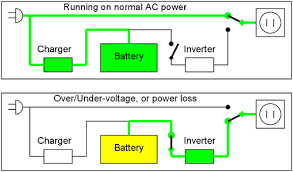Online and Offline UPS

Online UPS and offline UPS are two different types of uninterruptible power supply (UPS) systems that are designed to provide backup power in the event of a power outage. Both types of UPS systems are used to protect critical equipment and data, but they differ in how they handle power outages and how they are designed.
An online UPS is designed to provide continuous, clean power to connected equipment. It does this by constantly converting incoming AC power to DC power, and then back to AC power using an inverter. This means that the output power is always in sync with the input power, and there is no interruption in power to connected equipment. Online UPS systems are typically more expensive than offline UPS systems, but they offer the highest level of protection and are often used in mission-critical applications such as data centers and hospitals.
An offline UPS, also known as a standby UPS, is designed to provide power to connected equipment only when there is a power outage. When power is present and stable, the UPS is "offline" and does not provide any power to connected equipment. When power is lost, the UPS switches to "online" mode and begins providing power to connected equipment. Offline UPS systems are typically less expensive than online UPS systems, but they offer a lower level of protection and are often used in less critical applications such as home offices and small businesses.
In summary, online UPS systems provide continuous, clean power to connected equipment and offer the highest level of protection, while offline UPS systems provide power to connected equipment only during power outages and offer a lower level of protection. The choice between an online UPS and an offline UPS depends on the level of protection required and the cost.

